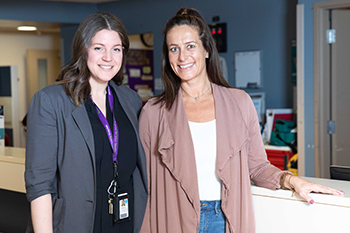Social workers lead positive change at Unity Health Toronto

By Emily Dawson
Celebrating Social Work Week from March 2 to 8
We often see patients struggling to find their way in a complex system — at a time that they’re coping with some of the toughest moments in their lives. Thankfully, there are almost 125 social workers at Unity Health Toronto to support and guide people through these challenges. We asked five of them to share a glimpse of their daily work.
Shifting perspectives in mental health
Denise Kwan is a social worker on the Short Stay Mental Health Unit at St. Joseph’s Health Centre.
“The starting place for me is looking at a person’s instrumental needs, such as housing and income. From there, every aspect of their care is about individualizing and collaborating on a treatment plan. We listen with compassion, take feedback and respond accordingly,” said Kwan.
“I also try to involve families in these discussions. I only see patients for a few days and they are the better judges of where the patient is at, what’s been going on and what’s important to them.”
Kwan is encouraged by the growing conversation about mental health in our society.
“We are all impacted by mental health and it’s often been this invisible thing that for so long was stigmatized and not discussed. A big part of the social worker role is being able to look at the patient holistically and understand that every person has a story – not just a diagnosis,” explained Kwan.
“Social workers have the opportunity to challenge the language we use to talk about mental health and advocate for system-level change. It’s a long process but the more we can have these courageous conversations, the more people will be open to talking about mental health and understanding its impact.”
Caring for families of patients in Trauma-Neuro
There’s a team of three social workers in the Trauma-Neuro (TN) program at St. Michael’s Hospital to support patients and families in the TN Intensive Care Unit (ICU) and its inpatient unit.
“In the ICU, we’re often supporting families watching their loved ones go through this unexpected, traumatic event and helping them navigate an abnormal situation. Sometimes it’s a simple as getting to know them, offering them a coffee, making sure they’re comfortable with the hospital and the information they’re getting,” said Rebecca Blidner.
Patrycja Birbaum and Stacey Harnden highlighted some of the ways that social workers help patients and families manage external stressors, including facilitating paperwork and bridging communications with the medical team.
“We slow things down for them. For example, if the patient is acutely unstable in the ICU, family members may not be able to come to the bedside so we have to facilitate that communication piece. During this time, we establish and foster rapport with the families and get a better sense of who this patient is, their value system and direction of care,” said Birbaum.
“Sometimes, the most important thing we can do is just sit with people and bear witness to their most difficult moments.”
“We have a program called Three Wishes for patients nearing the end of life,” Harnden added.
“This is so helpful for families and allows them to take part in something meaningful to them. It might be grandchildren painting their grandfather’s handprints while the family shares stories. These small gestures bring great comfort and help us offer someone a more dignified death.”
Normalizing conversations about dying
Talking about death and grief is essential in Tracy Stober’s work on the Palliative Care unit at Providence Healthcare. She appreciates that everyone has a story, likes, dislikes and worries that impact how they think about and experience dying.
“We want people to live life with us, to live as long and with as much quality of life as possible,” said Stober.
To help people through the dying process, she often encourages patients to think about their legacy and she’ll sit with them to write letters or do something important for those they love.
“I’m able to help by just being present, listening to their stories, asking them how they are. I’ve seen patients actually cry when I ask that, because most people are afraid to genuinely ask ‘how are you’ of someone who’s dying.”
After someone passes away, Stober will reconnect with their family after a few weeks to gauge how they’re coping with their loss. Talking about grief is equally as important as talking about dying.
“Nobody talks about grief and it can make the person grieving feel very alone. When someone, like a social worker, is comfortable talking about grief, people think, ‘Oh, I finally have someone to talk to about this and I’m not alone with all these feelings,’” said Stober.
